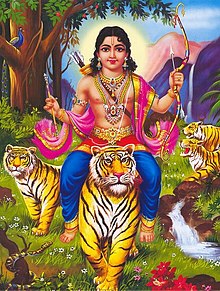
Back আয়াপ্পান Bengali/Bangla Ayappa CRH Ayyappan Spanish Ayyappan French अय्यप्पा HI Ayyappan ID Ayyappan Italian ಅಯ್ಯಪ್ಪ KN അയ്യപ്പൻ Malayalam Ajjappan Polish
| Ayyappan | |
|---|---|
God of Truth, Righteousness, Self-Discipline and Brahmacharya | |
 Ayyappa(n) seated on a tiger | |
| Affiliation | Hinduism |
| Abode | Sabarimala |
| Mantra | Svāmiye Śaraṇam Ayyappa[1] |
| Weapon | Bow and arrow, sword |
| Symbols | Bell, bow and arrow |
| Day | Saturday |
| Mount | Tiger, Stallion |
| Texts | Brahmanda Purana |
| Gender | Male |
| Festivals | Makaravilakku |
| Genealogy | |
| Born | Manikandan |
| Parents | |
Ayyappan, also known as Dharmasastha and Manikandan, is the Hindu deity of truth and righteousness. According to Hindu theology, he is described as the son of Shiva and Mohini (the female avatar of Vishnu), thus representing a bridge between Shaivism and Vaishnavism.
Ayyappan is a warrior deity and is revered for his ascetic devotion to Dharma, the ethical and right way of living. He is usually depicted as a youthful man riding or near a Bengal tiger and holding a bow and arrow. In some representations, he is seen holding a sword and riding an Indian elephant or a horse. Other iconography generally shows him in a yogic posture wearing a bell around his neck.
The legend and mythology of Ayyappan varies across regions, reflecting a tradition that evolved over time. According to Malayalam lore, Ayyappan is presented as a warrior prince of Pandala kingdom. In the later years, the stories of Ayyappan expanded with various versions describing him as a warrior who protected people from evil doers while helping restore Dharmic practices and he evolved to be a deity. In some regions, Ayyappan and Tamil folk deity Ayyanar are considered to be the same with similar characteristics.
Although Ayyappan worship has been prevalent earlier in Kerala, his popularity spread in the 20th century to most of Southern India. His abode Sabarimala is located on the banks of river Pamba in the forests of the Western Ghats, and is a major pilgrimage destination, attracting millions annually. Pilgrims often engage in weeks of preparations in advance by leading a simpler life, remaining celibate, and trekking to the hill on barefoot while carrying an irumudi (a bag with offerings) on the head.
- ^ Younger 2002, p. 21.